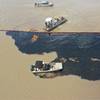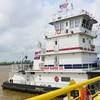FE Modelling Under Discussion
Even though the finite element method has been used in shipbuilding for more than 30 years, modelling is still a current topic. Today, the most efficient way is FE modelling from scratch, that is without or only minimal utilisation of already existing CAD data. The reason for this is the considerably different requirements regarding presentation of the ship structure for design/construction (CAD) and global calculation (FE). Therefore, the CAD manufacturers are currently working on a more suitable CAD presentation of the ship structure which is supposed to facilitate the direct use of the CAD data for the global FE modelling.
Rafael Doig, Thyssen Krupp Marine Systems (TKMS), gave an overview on the procedure of global ship modelling and strength assessment as part of the ship design process with TKMS. He highlighted benefits of the described tool, showed possible improvement opportunities and opened the discussion about finding an efficient analysis procedure.
Perti Arkke, Deltamarin, presented the application of NAPA STEEL which is creating FE-models and automatic FE-net generator in coarse mesh FE-models. He focused on the modelling and scaling of wave loads in vertical and longitudinal strength in moment and shear force.
"The conflicting modelling requirements between FE computation and assessment for global ship analysis" was discussed by Marc Wilken, Germanischer Lloyd. "In general the assessment cannot be performed only using the global finite element model and results - additional information about structural details or loads are also needed", said Wilken who also showed ways to handle these conflicts.
Thorsten Priebe, Germanischer Lloyd, highlighted the functionalities of GL ShipModel. The pre-processor for generating FE models for global strength and vibration analyses is based on MSC.Patran, a pre- and post processor for CAE simulation. It features design-oriented functions that allow fast and efficient modelling for containerships, bulk carriers, tankers, naval vessels, ferries and motor yachts. Key features include a raster philosophy for a user controlled subdivision of the model and semi-automatic modelling of surfaces and curves with attached structural.
Werner Kaufmann, MSC, gave a short introduction in the SimEnterprise Product Suite and showed how feature "templates" can be used to do local mesh refining on a global FE model in a user-friendly and time-saving way. Thomas Gosch, FSG, went into details about the comparison of forced Vibration Results based on early and late Stage Finite Element Models.
Dr. Crerar Christie, QinetiQ, presented an outline of analyses at QinetiQ Rosyth that indicate QinetiQ's approach to global ship modelling, local modelling for crack analysis, and a structured approach to the interchange of engineering data for design over multi-disciplinary requirements.
Francisco Viejo De Francisco, NAVANTIA, informed in his speech about "Recent developments in structural global analysis" and highlighted the latest developments in structural analysis for naval. Special requirements have to be implemented in the design of naval ships, for example, underwater shock, internal and external blast, ballistic protection and residual strength. Global analyses by means of finite element are needed in the preliminary design phase to assess the impact in the structure of operational requirements.









